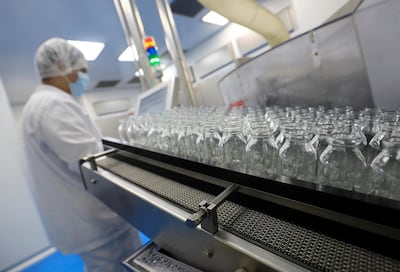Egyptian drugmaker Eva Pharma will start manufacturing a local Covid-19 vaccine using "100 per cent Egyptian technology" as soon as this year, chief executive Riad Armanious told The National.
“We’re doing extensive testing and extensive work to develop a vaccine from scratch that is our own,” Mr Armanious said.
Last month, Egyptian Prime Minister Mostafa Madbouly approved the signing of a partnership deal between the higher education and scientific research ministry, the agriculture ministry and Eva Pharma to produce a coronavirus vaccine, but additional details were not disclosed.
The vaccine production facility at Eva Pharma’s factory in the 6th of October City on the outskirts of Cairo has been under construction since February.
“By the end of year we should have human vaccine production in the facility from scratch and we should have first production fully made by June 2022,” Mr Armanious said.
It was previously reported that Eva Pharma, Egypt’s second oldest pharmaceutical company, would be producing China’s Sinovac vaccine. But Mr Armanious said this was not true.
The race to increase Covid-19 vaccine supply through local production has become critical in the country of 100 million, where only 3.3 per cent of the population has been given one dose and 0.7 per cent is fully vaccinated.
Egypt has reported 278,295 Covid-19 cases in total, including 15,935 deaths, although the actual number is thought to be far higher owing the exclusion of private laboratory results from the figures and limited testing.
State-owned vaccine maker Vacsera signed an agreement with Sinovac in April to produce 40 million doses locally by the end of the year.
The first batch, of two million doses, is due to be ready before July.
A second Vacsera plant in 6th of October city is being built at a cost of over $22 million.
The vaccine production complex will be the largest in the Middle East and Africa, with a capacity to manufacture three million doses a day, Egypt’s health ministry said.
Its statement was made after an inspection by Health Minister Hala Zayed on Sunday.
Egyptian pharmaceutical firm Minapharm will produce more than 40 million doses a year of Russia’s Sputnik V coronavirus vaccine under an agreement signed with the Russian Direct Investment Fund, which markets the vaccine abroad.
The launch is expected in the third quarter of this year, according to the deal signed in April.
Egypt has received 3.3 million doses of the AstraZeneca vaccine, mainly through the Covax initiative that aims to ensure equitable vaccine distribution.
It has also received three million doses of the Sinopharm shot and 500,000 of Sinovac’s, both of which are Chinese.
Mr Armanious said Eva Pharma was addressing not only for the vaccine supply shortfall in the short term, but the long-term needs of inoculating the Egyptian population against Covid-19.
“We weren’t prepared for this inevitable circumstance. We are still not doing enough to prepare for this repeating itself,” he said.
“If you need to vaccinate everybody every year, let alone every six months, then only the rich countries will be able to vaccinate enough people.”
Eva Pharma, established in 1997, has its roots in a family-owned business dating back to 1917, when the original Dr Riad Armanious laid the foundations of Armanious Group.
Today, Eva Pharma has three factories in Cairo, producing more than 240 medicines.
In June last year, it received a licence from Gilead Sciences to make remdesivir, used in the treatment of moderate to severe Covid-19 cases, and distribute it in 127 countries.

The company has collaborated with others to produce vaccines previously, but for veterinary use only.
While the local production of existing vaccines involves receiving the raw materials and completing the formulation and filling, creating a new vaccine takes more research, testing and time, he said.
“The more difficult part is to produce the actual protein that then gets purified, formulated and filled.”
Once complete, the factory will have the capacity to produce tens of millions of doses each month.
“We need to have extra capacity for what we don’t know and we need to have extra capacity already for Covid-19,” Mr Armanious said.

